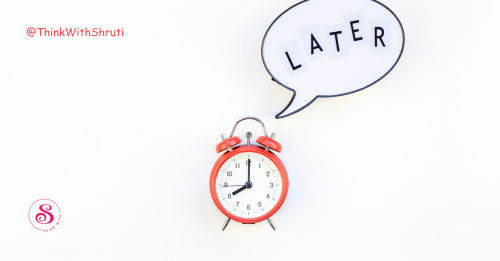We all have said it sometime, “I will do it later”. Procrastination, the art of delaying tasks unnecessarily, is a common human experience. We all have moments when we’d rather do anything other than the task at hand, whether it’s studying for an exam, completing a work project, or even doing household chores. Understanding why we procrastinate and learning effective strategies to overcome it is crucial for personal and professional growth. In this comprehensive guide, we’ll delve into the psychology of procrastination, its consequences, and practical techniques to beat it.
Section 1: The Psychology of Procrastination
The Procrastination Paradox Explore the paradox of procrastination, where we delay tasks despite knowing they are important or even enjoyable. We’ll discuss why procrastination is a common behavior.
The Procrastinator’s Mindset Gain insight into the mindset of a procrastinator. We’ll examine how factors like fear of failure, lack of motivation, and poor self-regulation contribute to procrastination.
Section 2: The Consequences of Procrastination
Academic and Career Impacts Discover the real-world consequences of procrastination in academic and professional settings. Case studies will illustrate how chronic procrastination can affect grades, job performance, and career advancement.
Emotional Toll Procrastination doesn’t just impact productivity; it can lead to increased stress, anxiety, and guilt. We’ll discuss the emotional toll of procrastination and its effects on mental health.
Section 3: Understanding the Procrastination Cycle
The Trigger Learn about the triggers that initiate procrastination. Explore how factors like task aversion, distractions, and lack of clarity play a role.
The Delay Dive into the procrastination cycle itself. Understand why we choose short-term relief (procrastination) over long-term gain (task completion).
Section 4: Strategies to Overcome Procrastination
Time Management Techniques Discover effective time management techniques, including the Pomodoro Technique, time blocking, and the two-minute rule. Real-world examples will highlight their effectiveness.
Goal Setting and Visualization Explore the power of goal setting and visualization in combating procrastination. We’ll provide actionable steps to set SMART goals and create a vision board.
Section 5: Beating Procrastination: Self-Regulation and Discipline
Building Self-Discipline Learn how to strengthen your self-discipline muscle. We’ll provide tips on creating a structured daily routine and using positive reinforcement.
The Role of Self-Regulation Understand the concept of self-regulation and its importance in overcoming procrastination. Self-assessment tests will help you identify areas for improvement.
Section 6: Overcoming Common Procrastination Traps
Perfectionism Explore how perfectionism can lead to procrastination. We’ll provide strategies to embrace imperfection and keep perfectionism in check.
Fear of Failure Understand the fear of failure and how it paralyzes us. Discover techniques to reframe failure as a learning opportunity.
Section 7: The Power of Accountability and Support
Accountability Partnerships Learn about the benefits of accountability partnerships and how they can keep procrastination at bay. Case studies will illustrate their effectiveness.
Professional Help In some cases, chronic procrastination may require professional intervention. We’ll discuss when it’s appropriate to seek help from a therapist or counselor.
Section 8: Maintaining Procrastination-Free Productivity
Consistency is Key Discover how maintaining consistency in your anti-procrastination strategies is crucial for long-term success. We’ll provide tips on staying on track.
Procrastination is a formidable foe, but with a deep understanding of its psychology and a toolkit of effective strategies, you can conquer it. By implementing the techniques discussed in this guide, you’ll not only boost your productivity but also enhance your overall well-being and achieve your goals.
References:
- Steel, P. (2007). The nature of procrastination: A meta-analytic and theoretical review of quintessential self-regulatory failure. Psychological Bulletin, 133(1), 65-94. Link
- Pychyl, T. A., & Flett, G. L. (2012). Procrastination and Self-Regulatory Failure: An Introduction to the Special Issue. Journal of Rational-Emotive & Cognitive-Behavior Therapy, 30(4), 203-212. Link
- Grant, H., & Dweck, C. S. (2003). Clarifying achievement goals and their impact. Journal of Personality and Social Psychology, 85(3), 541-553.
- Clear, J. (2018). Atomic Habits: An Easy & Proven Way to Build Good Habits & Break Bad Ones. Avery.
- Steel, P. (2011). The Procrastination Equation: How to Stop Putting Things Off and Start Getting Stuff Done. HarperCollins.


[…] Procrastination is one of the most common time-wasting activities. It involves delaying essential tasks and choosing momentary pleasure over long-term success. For example, constantly postponing work or study sessions, despite looming deadlines, is a classic example of procrastination. Overcoming procrastination requires improved time management and self-discipline. […]